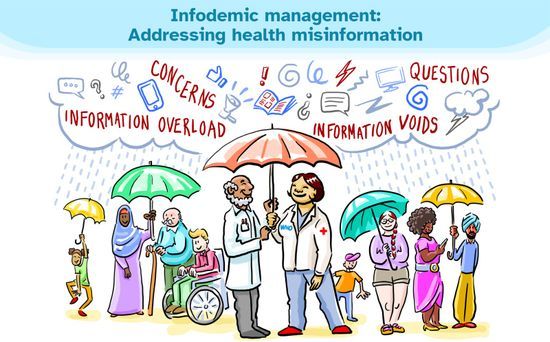
In the recent years, the circulation of health misinformation and disinformation has exploded with the digitalized information ecosystem, affecting the ability of health systems to promote public health, especially during health emergencies. Public health workers need knowledge and skills to manage harm from health misinformation. This course will help them to better understand the infodemic mechanisms that underlie the emergence and spread of misinformation, and how to intervene to better prevent and respond to it.
Язык: English
Health topic
Информация о курсе
This course is also available in these following languages:
Overview: Public health authorities have a duty to share health information with the population so that people can adopt adequate behaviours to protect their health and the health of others. However, in our modern information ecosystem this objective can be challenged by the overflow of information of varying quality that surges across digital and physical environments during acute public health event. Understanding how this infodemic, including mis- and disinformation, links to people's intent and behaviour in different communities online and offline, and how to manage it, has become critical for effective preparedness and prevention of health threats.
This course introduces the learners to the concept of health misinformation in an infodemic management context, what harms it can cause, how it spreads, and how to prevent and manage it. After completing this course, interested participants can enrol in further courses of the infodemic management OpenWHO course series as they become available.
Duration: Approximately 3 hours
Certificates: A certificate of achievement will be available to participants who score at least 80% of the total points available in the final assessment. Participants who receive a certificate of achievement can also download an Open Badge for this course. Click here to learn how.
Should you be interested in learning more about other aspects of infodemic management, please refer to the remaining modules of this course series:
- Infodemic Management 101
- Infodemic Management: Developing an infodemic insights report
Infodemic Management: Social marketing and message testing methods
Infodemic Management: Defining a taxonomy for social listening
Infodemic Management: Using human-centered design good practices
Infodemic Management: Working effectively as an infodemic manager in the field
Что вы узнаете
- Explain how an infodemic contributes to public health challenges
- Demonstrate the relationship of misinformation with questions, concerns and information voids
- Discuss misinformation in the global health context
- Describe the common types of misinformation
- List common reasons why people share misinformation
- Identify what infodemic management interventions and strategies to use according to your role
- Describe various interventions you can use to address health misinformation
- Pick and choose strategies and tools adequate to include in your strategy to address health misinformation
Содержимое курса
Introduction to the course
Module 1: The information environment and risks of health misinformation:
By the end of this module, you will: explain what infodemic management is and how it can address health misinformation; trace the history of misinformation to present day; to argument why debunking and fact-checking is not enough to address misinformation; describe the importance of information voids and how narratives evolve with time, and why evidence generation is essential to underpin infodemic management.Module 2: The psychology behind the spread of health misinformation:
By the end of this module, you will: define what is misinformation and what is disinformation; explain the psychology behind the spread of health misinformation; identify the common types of mis- and disinformation; describe the tactics used by disinformation purveyors; give examples of psychological drivers of misinformation spread; and describe what is the science currently developed to address it, including the infodemic management interventions’ taxonomy.Module 3: Strategies and tools for addressing health misinformation:
By the end of this module, you will: map possible infodemic management interventions and strategies as it exists; present examples of different ways to address health mis-information in different roles; list interventions of science and health communication that can address health mis-information; select education and training interventions to build resilience to mis-information; describe various types of engagement interventions that can help address mis-information; and identify what are the laws, regulations and ethics considerations that surround these strategies and tools.Final assessment
Записаться на этот курс
Требования для получения сертификата
- Чтобы получить сертификат об окончании курса, участникам необходимо набрать не менее 80% от максимального количества баллов за все задания на оценку.
- Gain an Open Badge by completing the course.